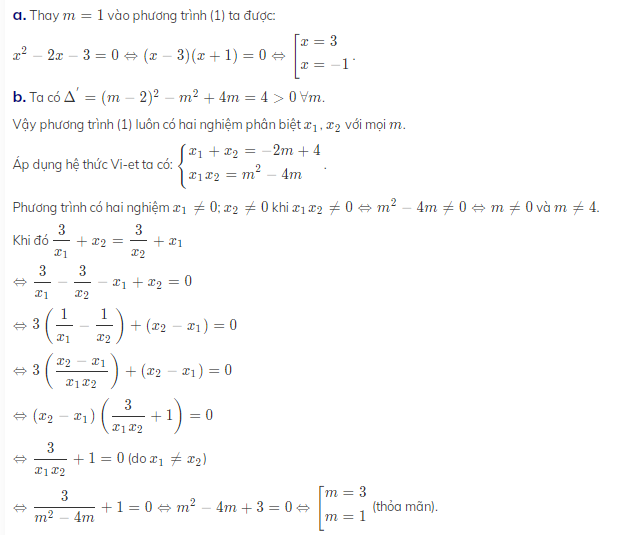Hãy nhập câu hỏi của bạn vào đây, nếu là tài khoản VIP, bạn sẽ được ưu tiên trả lời.

Phương trình có : \(\Delta=b^2-4ac=\left[-\left(m+1\right)\right]^2-4.1.\left(-2\right)\)
\(\Rightarrow\Delta=\left(m+1\right)^2+8>0\)
Suy ra phương trình có hai nghiệm phân biệt với mọi \(m\).
Theo định lí Vi-ét : \(\left\{{}\begin{matrix}x_1+x_2=m+1\\x_1x_2=-2\end{matrix}\right.\)
Theo đề bài : \(\left(1-\dfrac{2}{x_1+1}\right)^2+\left(1-\dfrac{2}{x_2+1}\right)^2=2\)
\(\Leftrightarrow\dfrac{\left(x_1-1\right)^2}{\left(x_1+1\right)^2}+\dfrac{\left(x_2-1\right)^2}{\left(x_2+1\right)^2}=2\)
\(\Leftrightarrow\dfrac{\left[\left(x_1-1\right)\left(x_2+1\right)\right]^2+\left[\left(x_2-1\right)\left(x_1+1\right)\right]^2}{\left[\left(x_1+1\right)\left(x_2+1\right)\right]^2}=2\)
\(\Leftrightarrow\left[\left(x_1-1\right)\left(x_2+1\right)\right]^2+\left[\left(x_2-1\right)\left(x_1+1\right)\right]^2-2\left[\left(x_1+1\right)\left(x_2+1\right)\right]^2=0\)
\(\Leftrightarrow\left(x_2+1\right)^2\left[\left(x_1-1\right)^2-\left(x_1+1\right)^2\right]+\left(x_1+1\right)^2\left[\left(x_2-1\right)^2-\left(x_2+1\right)^2\right]=0\)
\(\Leftrightarrow-4x_1\left(x_2+1\right)^2-4x_2\left(x_1+1\right)^2=0\)
\(\Leftrightarrow x_1x_2^2+2x_1x_2+x_1+x_1^2x_2+2x_1x_2+x_2=0\)
\(\Leftrightarrow x_1x_2\left(x_1+x_2\right)+4x_1x_2+\left(x_1+x_2\right)=0\)
\(\Rightarrow-2\left(m+1\right)+4\cdot\left(-2\right)+m+1=0\)
\(\Leftrightarrow m=-9\)
Vậy : \(m=-9.\)

a, \(\Delta=m^2-4\left(-4\right)=m^2+16\)> 0
Vậy pt luôn có 2 nghiệm pb
b, Theo Vi et \(\left\{{}\begin{matrix}x_1+x_2=m\\x_1x_2=-4\end{matrix}\right.\)
Ta có \(\left(x_1+x_2\right)^2-2x_1x_2=5\)
Thay vào ta được \(m^2-2\left(-4\right)=5\Leftrightarrow m^2+3=0\left(voli\right)\)
Bạn ơi, mình có thể hỏi câu c được không ạ? Nếu không được thì không sao, mình cảm ơn câu trả lời của bạn ạ ^-^ chúc bạn một ngày tốt lành nhé.

a) Khi \(m=1\) ta có phương trình \(x^2-3x+1=0\)
\(\Delta=3^2-4=5\)
Phương trình có 2 nghiệm phân biệt \(x_1=\dfrac{3-\sqrt{5}}{2};x_2=\dfrac{3+\sqrt{5}}{2}\)
b) Xét phương trình \(x^2-3x+m=0\left(1\right)\)
\(\Delta=9-4m\)
PT có hai nghiệm phân biệt \(\Leftrightarrow\Delta>0\Leftrightarrow9-4m>0\Leftrightarrow m< \dfrac{9}{4}\)
Áp dụng hệ thức Vi-et ta có: \(\left\{{}\begin{matrix}x_1+x_2=3\\x_1x_2=m\end{matrix}\right.\)
Để \(x_1^2+x_2^2=2021\Leftrightarrow\left(x_1+x_2\right)^2-2x_1x_2=2021\)
\(\Leftrightarrow3^2-2m=2021\Leftrightarrow2m=-2012\Leftrightarrow m=-1006\) (TM)

a, \(x^2-4x+3=0\Leftrightarrow x^2-x-3x+3=0\)
\(\Leftrightarrow x\left(x-1\right)-3\left(x-1\right)=0\Leftrightarrow\left(x-3\right)\left(x-1\right)=0\Leftrightarrow\orbr{\begin{cases}x=3\\x=1\end{cases}}\)
Vậy tập nghiệm của phương trình là S = { 1 ; 3 }
b, Ta có : \(\Delta=\left(2m+2\right)^2-4\left(2m-5\right)=4m^2+8m+4-8m+20=4m^2+24>0\forall m\)
Theo Vi et ta có : \(\hept{\begin{cases}x_1+x_2=-\frac{b}{a}=2m-2\\x_1x_2=\frac{c}{a}=2m-5\end{cases}}\)
Ta có : \(\left(x_1^2-2mx_1-x_2+2m-3\right)\left(x_2^2-2mx_2-x_1+2m-3\right)=19.1=1.19\)
TH1 : \(\hept{\begin{cases}x_1^2-2mx_1-x_2+2m-3=19\\x_2^2-2mx_2-x_1+2m-3=1\end{cases}}\)
Lấy phương trình (1) + (2) ta được :
\(x_1^2+x_2^2-2mx_1-2mx_2-x_2-x_1+4m-6=20\)
mà \(\left(x_1+x_2\right)^2=4m^2+8m+4\Rightarrow x_1^2+x_2^2=4m^2+8m+4-2x_1x_2\)
\(=4m^2+8m+4-2\left(2m-5\right)=4m^2+4m-6\)
\(\Leftrightarrow4m^2+4m-6-2m\left(2m-2\right)-\left(2m-2\right)+4m-6=20\)
\(\Leftrightarrow4m^2+4m-6-4m^2+4m-2m+2+4m-6=20\)
\(\Leftrightarrow10m=30\Leftrightarrow m=3\)tương tự với TH2, nhưng em ko chắc lắm vì dạng này em chưa làm bao giờ

\(x^2-2\left(m+1\right)x+3m-3=0\left(1\right)\)
\(\Delta'>0\Leftrightarrow\left(m+1\right)^2-\left(3m-3\right)=m^2-m+4>0\left(đúng\forall m\right)\)
\(đk\) \(tồn\) \(tại:\sqrt{x1-1}+\sqrt{x2-1}\)
\(\Leftrightarrow1\le x1< x2\Leftrightarrow\left\{{}\begin{matrix}\left(x1-1\right)\left(x2-1\right)\ge0\\x1+x2-2>0\end{matrix}\right.\)
\(\Leftrightarrow\left\{{}\begin{matrix}x1x2-\left(x1+x2\right)+1\ge0\\2\left(m+1\right)-2>0\end{matrix}\right.\Leftrightarrow\left\{{}\begin{matrix}3m-2-2\left(m+1\right)+1\ge0\\m>0\end{matrix}\right.\)
\(\Leftrightarrow m\ge4\)
\(\Rightarrow\sqrt{x1-1}+\sqrt{x2-1}=4\Leftrightarrow x1+x2-2+2\sqrt{\left(x1-1\right)\left(x2-1\right)}=16\)
\(\Leftrightarrow2\left(m+1\right)+2\sqrt{x1.x2-\left(x1+x2\right)+1}=18\)
\(\Leftrightarrow\left(m+1\right)+\sqrt{3m-3-2\left(m+1\right)+1}=9\)
\(\Leftrightarrow m-4+\sqrt{m-4}=4\)
\(đặt:\sqrt{m-4}=t\ge0\Rightarrow t^2+t=4\Leftrightarrow\left[{}\begin{matrix}t=\dfrac{-1+\sqrt{17}}{21}\left(tm\right)\\t=\dfrac{-1-\sqrt{17}}{21}\left(ktm\right)\end{matrix}\right.\)
\(\Rightarrow\sqrt{m-4}=\dfrac{-1+\sqrt{17}}{21}\Leftrightarrow m=....\)
\(\)

pt. 2 mghiemej pb
`<=>Delta>0`
`<=>(m+2)^2-4(3m-6)>0`
`<=>m^2+4m+4-12m+24>0`
`<=>m^2-8m+28>0`
`<=>(m-4)^2+8>0` luôn đúng
Áp dụng vi-ét ta có:`x_1+x_2=m+2,x_1.x_2=-3m-6`
`đk:x_1,x_2>=0=>x_1+x_2,x_1.x_2>=0`
`=>m+2>=0,3m-6>=0`
`<=>m>=2`
`pt<=>x_1+x_2+2sqrt(x_1.x_2)=4`
`<=>m+2+2sqrt{3m-6}=4`
`<=>3m+6+6sqrt(3m-6)=12`
`<=>3m-6+6sqrt(3m-6)=0`
`<=>3m-6=0`
`<=>m=2(tmđk)`
Vậy m=2

a, Thay m = -1 vào phương trình trên ta được
\(x^2+4x-5=0\)
Ta có : \(\Delta=16+20=36\)
\(x_1=\frac{-4-6}{2}=-5;x_2=\frac{-4+6}{2}=1\)
Vậy với m = -1 thì x = -5 ; x = 1
b, Vì x = 2 là nghiệm của phương trình trên nên thay x = 2 vào phương trình trên ta được :
\(4+8+3m-2=0\Leftrightarrow3m=-10\Leftrightarrow m=-\frac{10}{3}\)
Vậy với x = 2 thì m = -10/3
c, Để phương trình có 2 nghiệm phân biệt thì \(\Delta>0\)hay
\(16-4\left(3m-2\right)=16-12m+8=4m+8>0\)
\(\Leftrightarrow8>-4m\Leftrightarrow m>-2\)
Theo Vi et ta có : \(\hept{\begin{cases}x_1+x_2=-\frac{b}{a}=-4\\x_1x_2=\frac{c}{a}=3m-2\end{cases}}\)
\(\Leftrightarrow x_1+x_2=-4\Leftrightarrow x_1=-4-x_2\)(1)
suy ra : \(-4-x_2+2x_2=1\Leftrightarrow-4+x_2=1\Leftrightarrow x_2=5\)
Thay vào (1) ta được : \(x_1=-4-5=-9\)
Mà \(x_1x_2=3m-2\Rightarrow3m-2=-45\Leftrightarrow3m=-43\Leftrightarrow m=-\frac{43}{3}\)